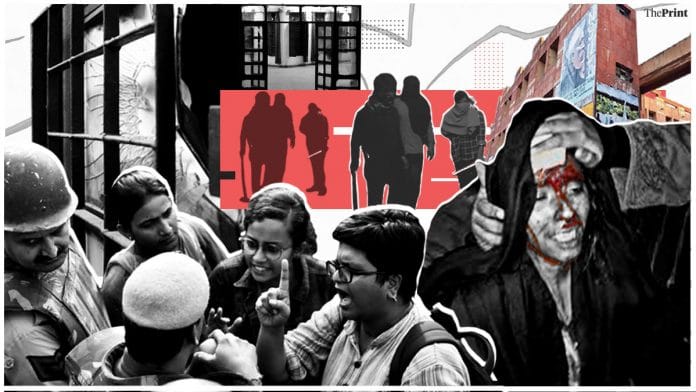After Sunday’s mob attack at JNU that left several teachers and students injured, the student union accused ABVP of leading the attack while the RSS’ student body and a section of media blamed Left-wing activists. JNU Teachers’ Association said the university administration was complicit and demanded a judicial inquiry into the attack and the resignation of Vice-Chancellor M. Jagadesh Kumar.
ThePrint asks: JNU violence: Student bodies turning as intolerant, confrontational as national politics?
Discussing a state-sponsored attack on JNU as intolerance of student groups is missing the point
 Nivedita Menon
Nivedita Menon
Professor of political thought, JNU
The issue of “intolerance” is irrelevant here. There is a government-backed attack on public universities because young people are rejecting the politics of Hindutva. What we see in JNU is the vicious face of the RSS twin agenda of establishing Hindu Rashtra and destroying all critical thinking.
What happened on JNU campus Sunday was a planned attack by an armed mob of outsiders who came with stones, rods, and sticks, and launched a violent attack on the unarmed teachers, then barged into hostels, selectively targeting rooms, and beating students. It was not one student group against the other, as the ABVP and some sections of the media have represented it.
This mob could not have entered the campus without the connivance of JNU security; even the Delhi Police remained unresponsive for hours. Discussing this state-sponsored attack as intolerance of student groups is missing the point.
After the attack, the mob was escorted outside by the police. About 30 people stood outside JNU shouting violent slogans (desh ke gadaaron ko, goli maaro saalon ko). Meanwhile, people who had gathered in support of JNU students were manhandled, beaten, and harassed while the police watched. Yogendra Yadav was pushed around; he has identified the JNU faculty member who was involved in the attack on him.
This latest episode is part of the agenda of establishing an authoritarian and violent Hindu Rashtra, which intends to end all access to education and annihilate minorities and all dissenters.
National parties are not intolerant. Student movements get aggressive, violent at times
 Swadesh Singh
Swadesh Singh
Assistant Professor, Delhi University
The question implies that national politics has turned intolerant, it has not. National political parties have differences but they never turn to violence. They know that power does not flow from the barrel of the gun. However, student movements led by youth leaders get aggressive and violent sometimes.
It’s important to remember that this is not the first time JNU has seen violent protests. The reason Sunday’s events captured national attention is because the visuals from the media and social media magnified the issue, especially since the campus is in the national capital.
Student movements are also magnified when opposition parties use it as a tool for their own political gain. They make campuses their battlegrounds because these are semi-autonomous spaces where the state can’t directly intervene. In the case of Jamia Millia Islamia, however, police intervention came into play only because students along with local people came out and burnt buses right outside the campus. More importantly, this is not a ‘Right versus Left’ situation, but is more about the fee-hike agitation in which common students were stopped from registering and those who registered themselves for this semester, were beaten up by those who had given a call to boycott the registration.
Modi govt rattled by solidarity across campuses in India & is resorting to extreme state action
 Umar Khalid
Umar Khalid
Activist and alumni, JNU
This is not an attack on just Jawaharlal Nehru University students and is in line with a spate of state-sponsored attacks on students and young people across India. JNU is just the most recent example. Before that, it was Jamia Millia Islamia and Aligarh Muslim University, and the actions of the police in those cases were very different.
Intolerance is not seeping into universities on its own. It is the Modi establishment that is attacking student bodies. They are clearly rattled by dissenting students who have been able to galvanise public opinion. They are also threatened by the solidarity that has emerged between campuses across India, and have resorted to fabricated narratives and extreme state action.
In this case, they have gone as far as to hire gundas to scare students. Also, the Modi government is directing the police to act in a certain way. Ministers who are JNU alumni have condemned the event but without mentioning who attacked whom. It shows that they are complicit in this violence.
The attack on JNU must also be seen in the context of the anti-fee hike movement that has been going on for the last three months. Students have raised the issue of affordable education and are fighting for everyone’s right to education.
The Modi government, which is communal and fascist, is also anti-poor. Look at how the allocation of funds for education has reduced with every Budget.
JNU violence is related to fee-hike protest and boycotting of registration led by Left-wing students
 Rohit Chahal
Rohit Chahal
National Media Incharge, BJP Youth Wing
The world has by and large left the communist ideology behind but it lives on in JNU on a ventilator. Left-wingers from JNU have raised anti-national slogans in the past while some have been arrested on sedition charges.
The violence that took place on JNU campus Sunday night is related to the fee-hike protest and boycotting of registration led by Left-wing students in the last two months. When manual registration for the semester was not possible, JNU’s Communication & Information Services set up online registration but the protesting students cut the Wi-Fi.
Students in favour of registering for the new semester felt like their education and future were in jeopardy. They weren’t even able to write their exams.
Many videos have surfaced on social media showing JNUSU president Aishe Ghosh and AISA activist Geeta Kumari sitting with the masked goons after the attack. What does it mean? There are other things that don’t add up, like how Yogendra Yadav came outside the campus gates so quickly.
Even if students belonging to communist parties were frustrated with those in favour of registration for the new semester, they should have tried to go and talk to them or at least convince them, not resort to violence to stop them.
Let’s see if Delhi Police acts against JNU attackers with same speed it did to detain anti-CAA protesters
 Pia Krishnankutty
Pia Krishnankutty
Journalist, ThePrint
The JNU attack cannot be viewed as an isolated incident about a fee hike and is no doubt linked to national politics and extreme state intervention in particular. The role of Delhi Police, slogans chanted by masked attackers and the central government’s apathy are clear signs of how the attack was not just about tensions between student bodies.
Looking at the number of students and teachers who suffered head injuries, the armed goons clearly came with a vengeance. The Delhi Police, which operates under the Ministry of Home Affairs, waited at the gates and did not respond to repeated pleas for intervention. It would be interesting to see whether the Delhi Police acts with the same vigour and speed to arrest goons who attacked JNU campus Sunday evening that it did in detaining anti-CAA protesters.
The central government has so far condemned the violence through tweets but the words are vague and rehearsed. Two top BJP ministers, both former students of JNU, failed to hold anyone accountable for the violence.
Also read: Does BJP have a CM face to take on Kejriwal in Delhi election or will it rely on Modi?
By Pia Krishnankutty, journalist at ThePrint







Worst form of intolerance is benign neglect, act as thogh you heard without listening. The Blacks faced it after 2nd world war and now it is little less. now. When Las Angeles burn again, intolerance will be measured hurriedly. In India, it is 2 or 3 day march ot hunger strike and Amit shah with thicker his skull will not let it sink in to him.
This goes beyond student politics, one fears. What the perpetrators hoped to achieve defies comprehension. Whatever transient fear and trauma it might visit upon the gifted students of JNU, the larger political cause is being comprehensively lost. Within hours, students were assembling in solidarity in different parts of the country, also rippling abroad. IIM A students – difficult to find a less political animal anywhere in the world – are being told by cops to exclude the word Democracy from their vocabulary. No better person than JNU alumnus, EAM, to sensitise the government how steep the gradient has become for Indian diplomacy.